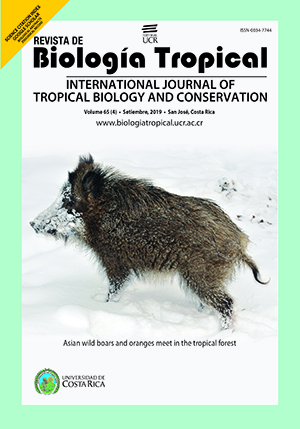Abstract
Introduction: Changes in microclimatic conditions due to land cover transformations influence variations in population life histories and the developmental patterns of organisms. These variations can have either a genetic basis, an environmental basis, or both. Objective: To determine the differences between habitats in the foraging activity of Atta cephalotes in response to changes in temperature and the extent to which any such differences are due to phenotypic plasticity, genetic variability, or both. Methods: We performed foraging experiments; each colony (4 colonies sourced from pasture and 3 colonies sourced from forest) underwent eight temperature treatments from 10 to 45 ºC (± 1 ºC) at 5 ºC intervals, using common garden and reciprocal transplant experiments. Results: We found high plasticity in the foraging activity of Atta cephalotes in response to temperature, with the foraging activity gradually increasing from 15 ºC to 35 ºC. Additionally, we found no significant differences in the foraging activity between the colonies sourced from the pasture and forest. Conclusions: The foraging activity of A. cephalotes was directly proportional to temperature, with ants exhibiting thermophilic behaviors and high plasticity, and there were no differences in the foraging activity between colonies sourced from both habitats.

This work is licensed under a Creative Commons Attribution 4.0 International License.
Copyright (c) 2019 Santiago Bustamante, Angela Amarillo-Suárez


